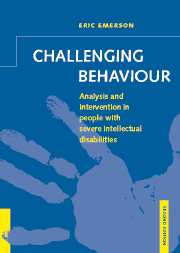9 - Community-based supports
Published online by Cambridge University Press: 14 August 2009
Summary
In the previous chapters of this book, we drew attention to the social significance of challenging behaviours. In short, such behaviours are relatively common, highly persistent and may lead to social exclusion, systematic neglect, inappropriate treatment and abuse. We then summarized current knowledge regarding the behavioural, biological and psychiatric processes underlying challenging behaviour before discussing a wide range of potentially effective approaches to intervention.
As was noted in the introductory chapter, much has been written over recent years about issues involved in developing and sustaining community-based supports for people with challenging behaviours (e.g. Allen, Banks & Staite, 1991; Allen & Felce, 1999; Blunden & Allen, 1987; Department of Health, 1989, 1993; Emerson, McGill & Mansell, 1994a; Fleming & Stenfert Kroese, 1993; Kiernan, 1993; Koegel et al., 1996a; Mental Health Foundation, 1997), including descriptions of innovative projects which have helped to demonstrate the viability and benefits of supporting people with severe challenging behaviour in the community (e.g. Cameron et al., 1998; Mansell, McGill & Emerson, in press; McGill, Emerson & Mansell, 1994; Risley, 1996).
Two distinct (though complementary) rationales underlie the development of community-based supports for people with severe challenging behaviour. Firstly, it has been argued that people with severe challenging behaviour have as legitimate an entitlement as all other people with intellectual disabilities to a decent quality of life. From this basis, supports may be developed to maximize quality of life regardless of the extent of challenging behaviour shown by the individual (cf. Emerson et al., 1994a).
Information
- Type
- Chapter
- Information
- Challenging BehaviourAnalysis and Intervention in People with Severe Intellectual Disabilities, pp. 144 - 154Publisher: Cambridge University PressPrint publication year: 2001
